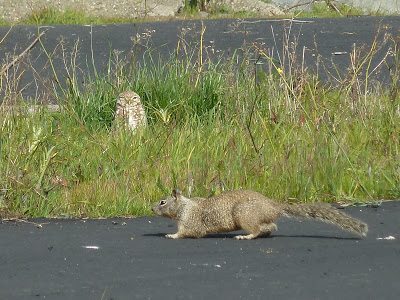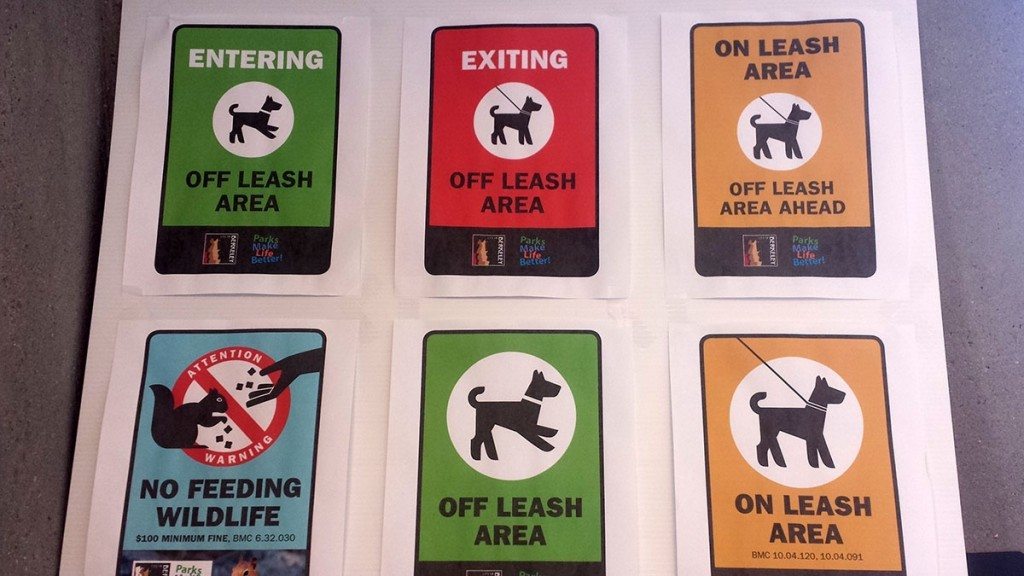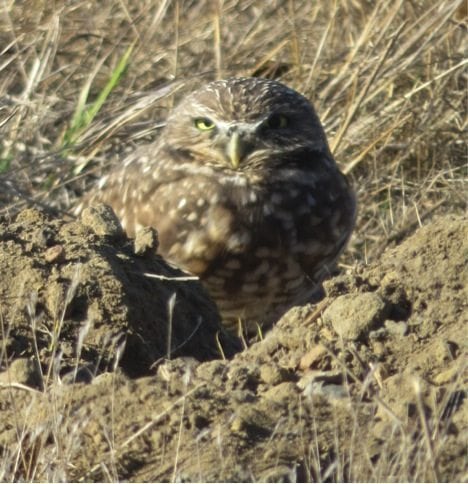A win for Berkeley’s squirrels — and Burrowing Owls
By Ilana DeBare
Do you recall the furor that erupted last spring when the City of Berkeley announced plans to exterminate thousands of ground squirrels at Cesar Chavez Park?
The Regional Water Quality Control Board had told the city to reduce the ground squirrel population due to concerns that squirrel burrows could allow contaminants from the landfill under the park to leach into the Bay.
But the plan would have been a disaster not just for the squirrels but for the park’s small winter population of Burrowing Owls, which rely on squirrel burrows for shelter. Over 80,000 people sent emails of protest to the city.
Golden Gate Bird Alliance’s East Bay Conservation Committee sprang into action. Together with other wildlife advocates including WildCare and In Defense of Animals, GGBA volunteers worked with city officials over a four-month period to come up with a humane alternative to the killings.
And this week marks the start of that new approach — one based on public education rather than mass extermination.

The new approach aims to reduce the park’s large squirrel population naturally, by discouraging people from feeding the squirrels. Among the initiatives:
- A new city law, passed in July and taking effect on October 1, that criminalizes the feeding of wildlife in city parks. Violators will face minimum fines of $100 after the initial “warning” period and up to $500 for multiple infractions within a year.
- New signage that will warn people not to feed wildlife.
- Brochures that explain why feeding squirrels may seem kind but is ultimately harmful. Wild animals that come to rely on human handouts risk malnutrition, spread of disease, and loss of fear of humans.
Without human handouts, the Cesar Chavez ground squirrel population will gradually disperse and decline. And there is plenty of time for this to happen. In the wake of last spring’s outcry, city officials determined that there is in fact no evidence of squirrel burrows currently causing toxics to leach into the bay. If it is a potential problem at all, it is a problem in the future — so there is time to reduce the squirrel population naturally.

In a joint press release this week, GGBA, WildCare and In Defense of Animals praised Berkeley for moving away from its original lethal plan.
“This approach can serve as a nationwide model for other parks faced with similar challenges where human feeding of wildlife has created an imbalance in wildlife populations,” they said.
Big thanks to the Golden Gate Bird Alliance volunteers who worked diligently to help produce this positive outcome: Carla Din, Della Dash, Frances DuPont, Toni Mester, Doug Mosher, Peter Rauch, and April Sommer.
We’re delighted that there will be plenty of welcoming burrows this winter for the return of our Burrowing Owls, which are legally classified as a Species of Special Concern in California.
Golden Gate Bird Alliance volunteer docents will be out at Cesar Chavez Park again this winter, helping passersby spot and learn about the owls. The owls — which have been documented breeding as far away as Idaho in the summer — typically return to Berkeley between late September and December.
Stop by the park this winter and look for our docents with their scopes! And while you’re there… enjoy but don’t feed the squirrels. 🙂
———————————–
Want to make a difference for East Bay wildlife? Join our East Bay Conservation Committee. The committee meets on the second Tuesday of each month at 7 p.m. at the Golden Gate Bird Alliance office, 2530 San Pablo Avenue, Suite G, Berkeley. For more information, please contact Phil Price, East Bay Conservation Committee Chair, at pnprice@creekcats.com.

